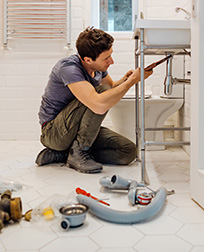All Categories
Featured

[/image][=video]
[/video]
However, prior to you rush to call a plumbing technician or make some poor do it yourself option, you may wish to have a look at these plumbing tricks that can save you money and time. It is essential to recognize where you water shut down valve remains in your home, as this can conserve you from even more severe damages when pipes concerns happen.
When everything is turned off, take an appearance at your water meter. An ongoing motion on your water meter when all water sources are transformed off is a clear red flag that requires instant attention.
Nevertheless, sluggish drains are commonly an early indication of a bigger issue. It could suggest a blockage in the making, a trouble with your sewer line, and even tree roots penetrating your pipes. As opposed to awaiting the drainpipe to come to be completely obstructed, do something about it as quickly as you notice a downturn.

If these do not work, it might be time to employ an expert. Overlooking the issue can result in much more significant and pricey issues down the line. Recognizing where your major water shutoff valve is can conserve you from potential water damage in case of a significant leak or pipes catastrophe.
Is Diy Plumbing Safe?
Ensure every family grown-up understands where the shutoff valve is and how to utilize it. In case of a severe leakage, promptly transforming off your home's water can lessen damage and offer you tranquility of mind while you wait on a plumbing to show up. It's a prominent concept that chemical drain cleaners are the supreme service for clogged drains pipes a notion that could not be further from the reality.
The chemicals can corrode the inner cellular lining of the pipelines, bring about weakened structures, leaks, and also pipe bursts. The ecological implications of these chemicals are substantial. They can seep right into groundwater and contaminate it, posturing risks to regional ecosystems. The price of these possible damages much outweighs the expense of any kind of temporary comfort these cleaners may provide.
These tools can efficiently clear blockages without creating any type of damage to your pipes. If these methods don't work, don't think twice to call a specialist.

Over-tightening can lead to many issues, consisting of removed screws and damaged bolts, resulting in leakages or also water damages. This usual blunder in DIY pipes projects can turn a small repair service right into a costly undertaking.
Should I Hire A Plumber?
Plumber's tape, or Teflon or string seal tape, is a must-have tool for every home owner. It develops watertight seals at pipeline threads, protecting against leakages at joints and links.

Before affixing any installations, take a minute to wrap a few layers of plumber's tape around the threads in a clockwise direction. Ensure the tape covers all the threads and is covered tightly. This easy yet essential step can save you from dealing with irritating leakages down the line.
However, remember that for larger issues, specialist aid is constantly suggested. Sink sprayers can be extremely convenient yet can additionally become discouraging when they fail to prolong fully or get stuck. This usual problem often takes place when the sprayer pipe gets gotten on the shutoff valves. To prevent this from taking place, think about mounting pipeline insulation.
And also, throughout cooler months, pipeline insulation can help avoid your pipelines from cold and rupturing a situation that can cause costly repair work. When it involves securing fixtures like taps, several do it yourself enthusiasts instinctively grab a plumbing's putty. But there's an alternative that might serve you far better silicone caulk.
Is Diy Plumbing Safe?
This versatility enables it to suit mild shifts or activities without breaking the seal, giving a more sturdy and durable option. Just keep in mind to allow the caulk cure totally according to the maker's instructions prior to exposing it to water to guarantee the most effective results. "Doping" in pipes refers to using pipe dope, or pipeline joint compound, to the threads of plumbing connections prior to they're screwed with each other.
Latest Posts
Is Diy Plumbing Safe?
Should I Do My Own Plumbing?
Is Diy Plumbing Safe?